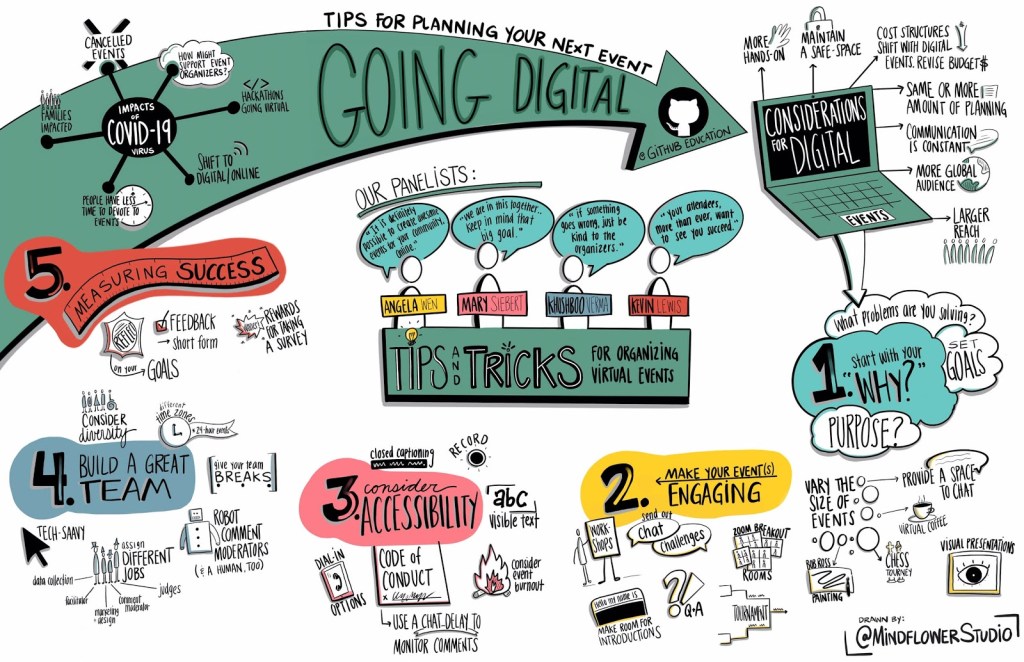Remote Education: A series of best practices for online campus communities
Remote Education explores the challenges of organizing student communities and events online. We’ll be speaking with event organizers and community leaders in the industry and academics every week to help…
Remote Education explores the challenges of organizing student communities and events online. We’ll be speaking with event organizers and community leaders in the industry and academics every week to help you bring your community online this semester.

Whether looking to move a hackathon online or to build a technical community (remotely) on campus, this school year will be different. But even through crummy connections and lagging live streams, there are ways to build community and create common experiences in the cloud.
From watching over 2,600 of you walk the virtual stage in GitHub Graduation to talking with a panel of organizers from Hack Quarantine and building the GitHub Lounge at HackCon VIII, we’ll explore what worked and share ideas to bring to your campus. Here are a few of our biggest lessons learned.
1. Start with “Why”?
Every event or community you build needs a why, and online is no different. What problem are you solving? What is your mission? Here are goals from some of our favorite communities –
- Hack Club: to make building things accessible to everyone
- Design Buddies: to create an inclusive community for designers from all backgrounds
- Major League Hacking: to empower hackers
- GitHub: to be the home for all developers
Start with your why, and then ask the best way to get there.
2. Make your events engaging
Events can no longer rely on attendees to entertain each other. The serendipitous encounters between speakers and 3 am bonding over bugs at a hackathon are hard to recreate online.
How can you redistribute the responsibility to engage attendees with opportunities to network and start a conversation? What is it about your content that will break through the infinite distractions at home?
Formats we’ve seen work well are small group discussions, competitions on platforms like Kahoots, or even running a scavenger hunt as a break from the main event track.
3. Consider accessibility and governance
Being globally accessible and often cheaper to run, online events break down many in-person barriers to entry. But there are still many elements to consider.
- Moderation. Have a code of conduct, and use your code of conduct. Insert a chat delay when possible and have teammates on hand to help if you are live streaming.
- Internet connection. Have a call-in option for attendees to participate, and record content for anyone who misses a segment.
- Live-captioning. Content is more accessible to those hard of hearing or anyone listening in a language other than their native language with captioning. If your event has a budget, consider a service specializing in technical presentations such as White Coat Captioning. Microsoft Teams has captioning as a built-in option. Add captions to Twitch using REV or Stream Closed Captioner.
4. Build a great team
Planning online events takes just as much if not more upfront time than an in-person event. Be prepared by building a great team. You need to be savvier with streaming and audio, and likely incorporate more video elements than before. Depending on the event’s scale, you may also need teammates in different time zones and more people on hand for moderation.
One element we hope to consider in future events is to include content moderators who speak multiple languages that may appear in our event’s dialogue. This helps to ensure the conversations on your platform are in line with your community expectations.
5. Measure success
Data is easier than ever to collect and monitor with online events. A few features to look for when considering platforms: tracking attendance and session drop out rate, number of unique chatters, geographic location, and the ability to poll attendees for feedback.
Looking for more tips and tricks? Watch a recording of our panel on running Hack Quarantine online and stay tuned next week for Hack Club’s story of going from after school clubs to a global, online community of high school hackers.
Written by
Related posts

GitHub availability report: January 2026
In January, we experienced two incidents that resulted in degraded performance across GitHub services.

Pick your agent: Use Claude and Codex on Agent HQ
Claude by Anthropic and OpenAI Codex are now available in public preview on GitHub and VS Code with a Copilot Pro+ or Copilot Enterprise subscription. Here’s what you need to know and how to get started today.

What the fastest-growing tools reveal about how software is being built
What languages are growing fastest, and why? What about the projects that people are interested in the most? Where are new developers cutting their teeth? Let’s take a look at Octoverse data to find out.